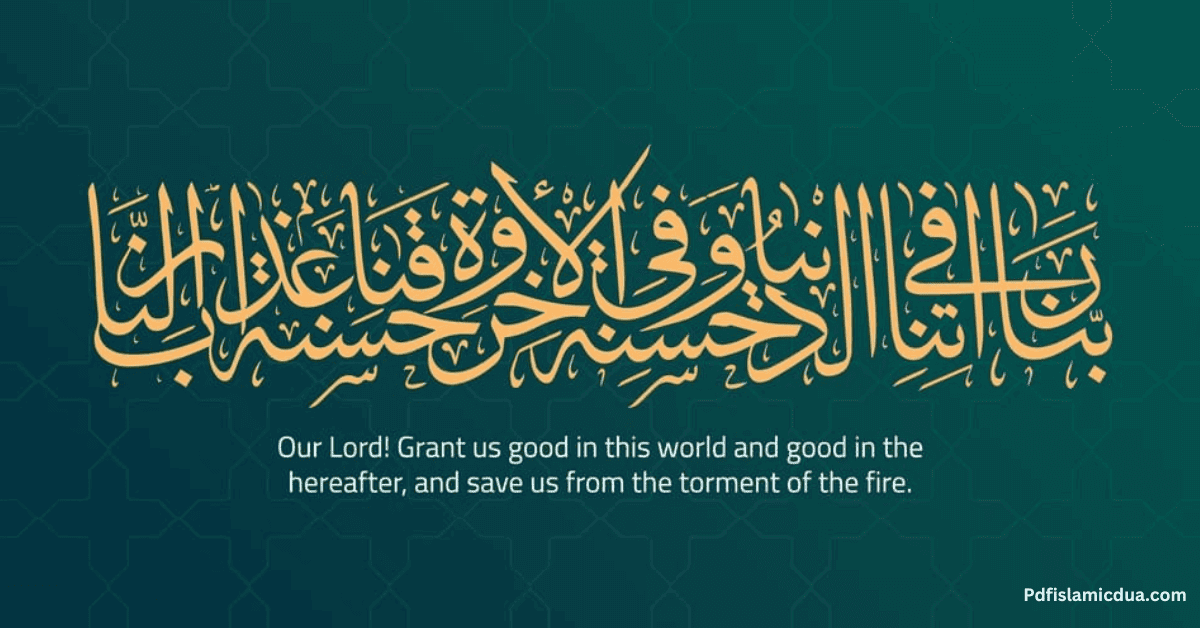Blog
Dua & Surah PDF
doa rabbana atina fiddunya hasanah, dua rabbana atina, rabbana, rabbana atina, rabbana atina dua, rabbana atina fid dunya, rabbana atina fid dunya hasana, rabbana atina fid dunya hasanah, rabbana atina fid dunya hasanah 100 times, rabbana atina fid dunya hasanah full dua, rabbana atina fid dunya hasanah full dua with urdu translation, rabbana atina fid-dunya hasanatan, rabbana atina fiddunya hasanah, rabbana atina fidunya, rabbana dua
pdfislamicdua
0 Comments
Rabbana Aatina Fid-Dunya Hasanah Full Dua Meaning & Benefits
The dua “Rabbana Aatina Fid-Dunya Hasanah” is a beloved supplication frequently recited by Prophet Muhammad (SAW), known for its power in including all requests for goodness in both this life and the Hereafter.
Found in Surah Al-Baqarah, Ayah 201, this verse is a precious treasure within the Quran, offering a complete prayer that seeks Allah’s blessings, mercy, and guidance. Reciting this dua regularly brings many benefits, as it includes prayers for protection, success, and well-being in all areas of life.
Rabbana Aatina Fid-Dunya Hasanah Full Dua Meaning
| Arabic Text | Transliteration | Translation |
|---|---|---|
| رَبَّنَآ ءَاتِنَا فِى ٱلدُّنْيَا حَسَنَةًۭ وَفِى ٱلْـَٔاخِرَةِ حَسَنَةًۭ وَقِنَا عَذَابَ ٱلنَّارِ | Rabbana aatina fid-dunya hasanatan wa-fil akhirati hasanatan wa-qina ‘adhaab an-nar. | Our Lord, grant us the best of this life and the best of the Hereafter, and protect us from the punishment of the Fire. [Qur’an 2:201] |
Recent Posts
- Allahumma Taqabbal Siyaama Full Dua with Meaning & Benefits
- Allahumma Aslamtu Nafsi Ilaika Full Dua in Arabic and Meaning
- Allahumma innaka afuwwan Full Dua – When to Say?
- Sawm the Fourth Pillar of Islam – Meaning Importance and Practice
- Facts About Zakat the Third Pillar Of Islam
Derivation
From Riyad as-Salihin 1467, Anas (RA) reported that the Prophet Muhammad (ﷺ) frequently recited this supplication:
“Allahumma atina fid-dunya hasanatan wa fil-akhirati hasanatan wa qina ’adhab-annar”
(O our Lord, grant us goodness in this world, goodness in the Hereafter, and save us from the punishment of the Fire).
This dua was so important that Anas (RA) would regularly use it in his own supplications.
[Al-Bukhari and Muslim]
In Sahih Muslim 2688 a, it is narrated that when a man prayed for punishment in this world instead of the Hereafter, the Prophet (ﷺ) advised him to ask for Allah’s mercy instead with this dua. After the Prophet’s supplication, the man recovered.
Importance of Surah Al-Baqarah, Ayah 201
This dua is a beloved supplication that asks Allah for blessings both in this life and the Hereafter. Surah Al-Baqarah, Ayah 201 emphasizes Islam’s teaching of finding balance in both worldly and spiritual matters.
Allah SWT provides the ideal way to make Dua, asking for success in both this world and the Hereafter, as well as protection from Hellfire. In Ayah 200, Allah SWT warns against those who only ask for worldly gains, without consideration for the Hereafter, which results in no share in the Hereafter
Immediately after, Allah SWT reveals the balanced approach of asking for both worldly and eternal goodness in Ayah 201.
Reciting this Dua shows trust in Allah SWT and highlights the importance of seeking blessings in all areas of life—health, wealth, knowledge, and success. The Dua reflects Islamic teachings that interconnect our actions in this world with our fate in the Hereafter.
Benefits of Rabbana Aatina Fid-Dunya
The word “ hasanah” in Arabic means “all that is good,” covering many aspects of life, including:
• A good spouse
• Pious children
• Success in business or career
• Health for you and your family
• Academic achievements
• Morality and ethics
• Beneficial knowledge
• Strength, courage, and integrity
When to Recite Rabbana Aatina Fid-Dunya
1. After Reading the Quran: Recite it after reading or reciting verses.
2. During Sujood (Prostration): Include it while in sujood.
3. During Salah: After obligatory prayers or before Tasleem.
4. In Times of Hardship: When seeking Allah’s help.
5. Moments of Gratitude: When feeling thankful for blessings.
6. Before Ending Salah: Add it before concluding your prayer.
7. During Reflection: When thinking about life goals or seeking Allah’s guidance.
Frequently Asked Questions
• Can we recite Rabbana Atina Fid-Dunya anytime?
Yes, it can be recited at any time to strengthen your connection with Allah.
• What does Rabbana mean in the Quran?
Rabbana means “Our Lord” or “Our Sustainer,” similar to rabbina or rabbuna which also mean “Our Lord.”














Post Comment